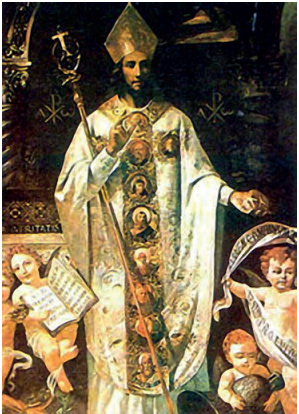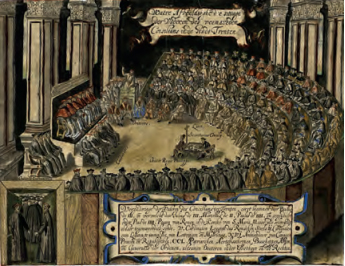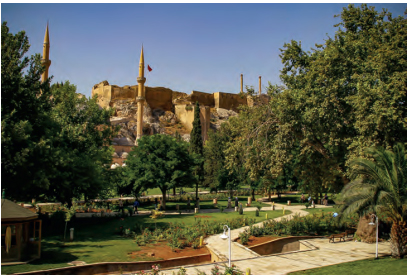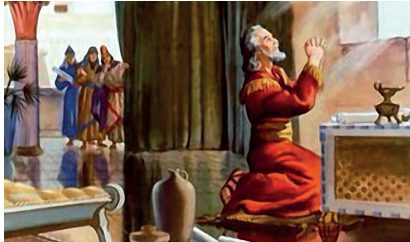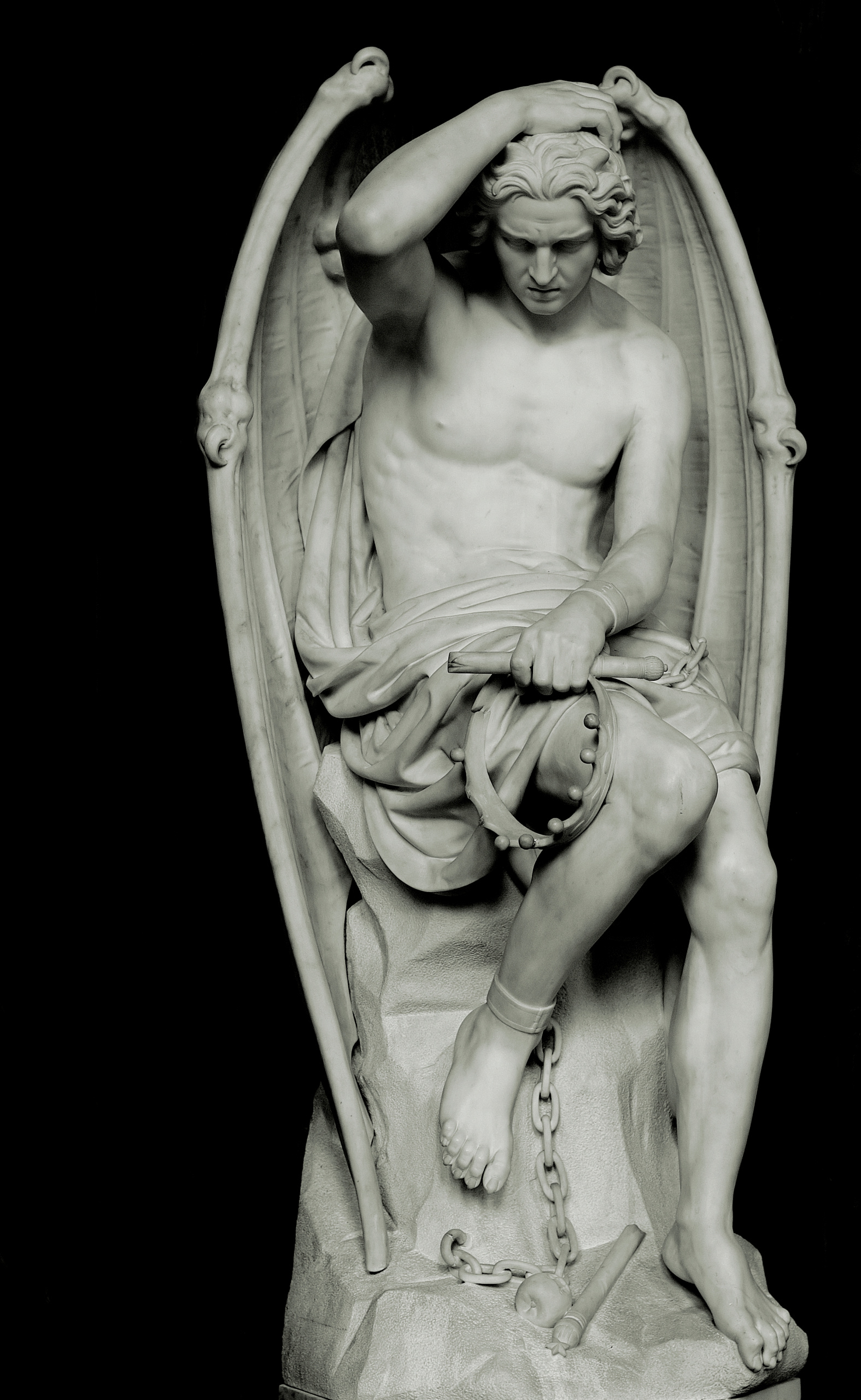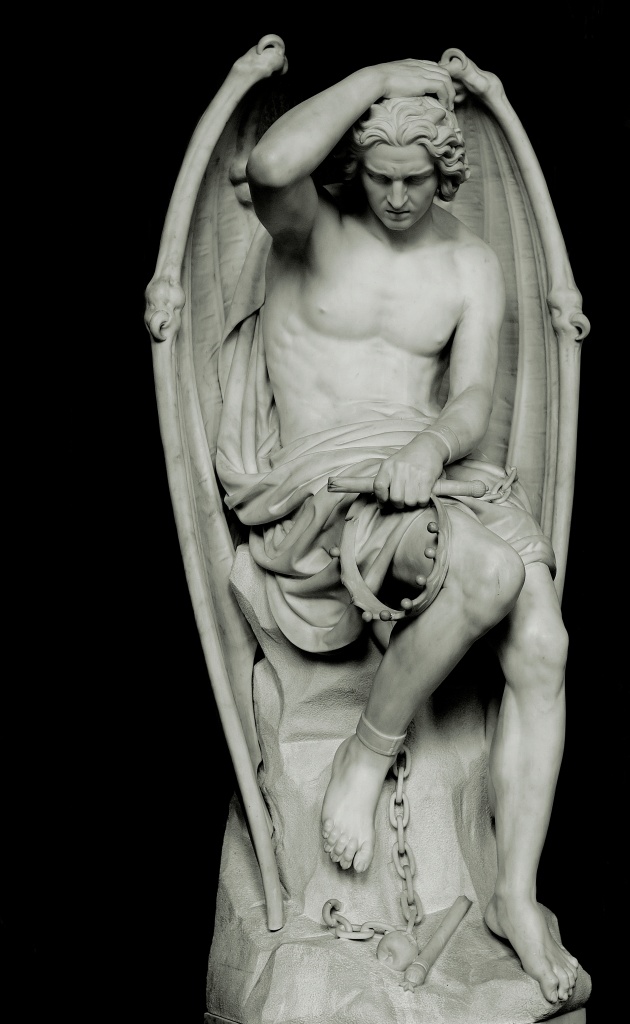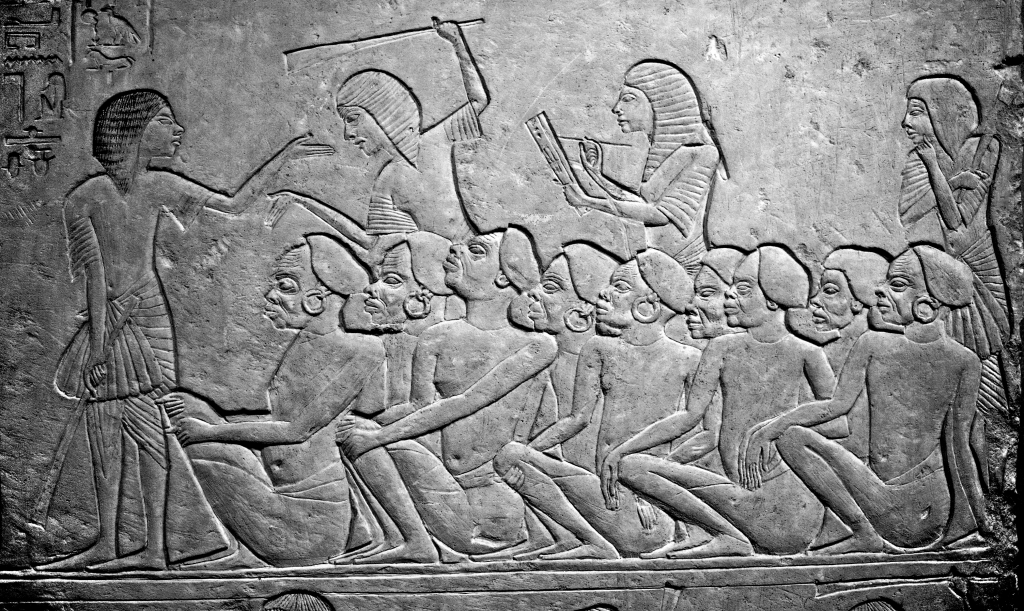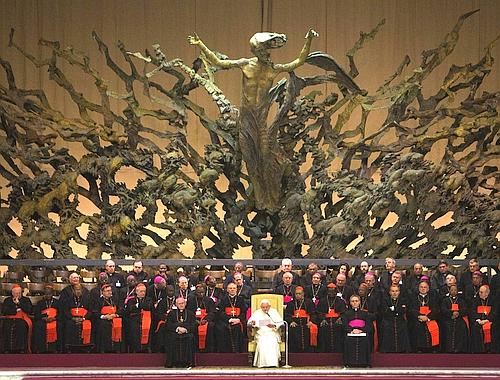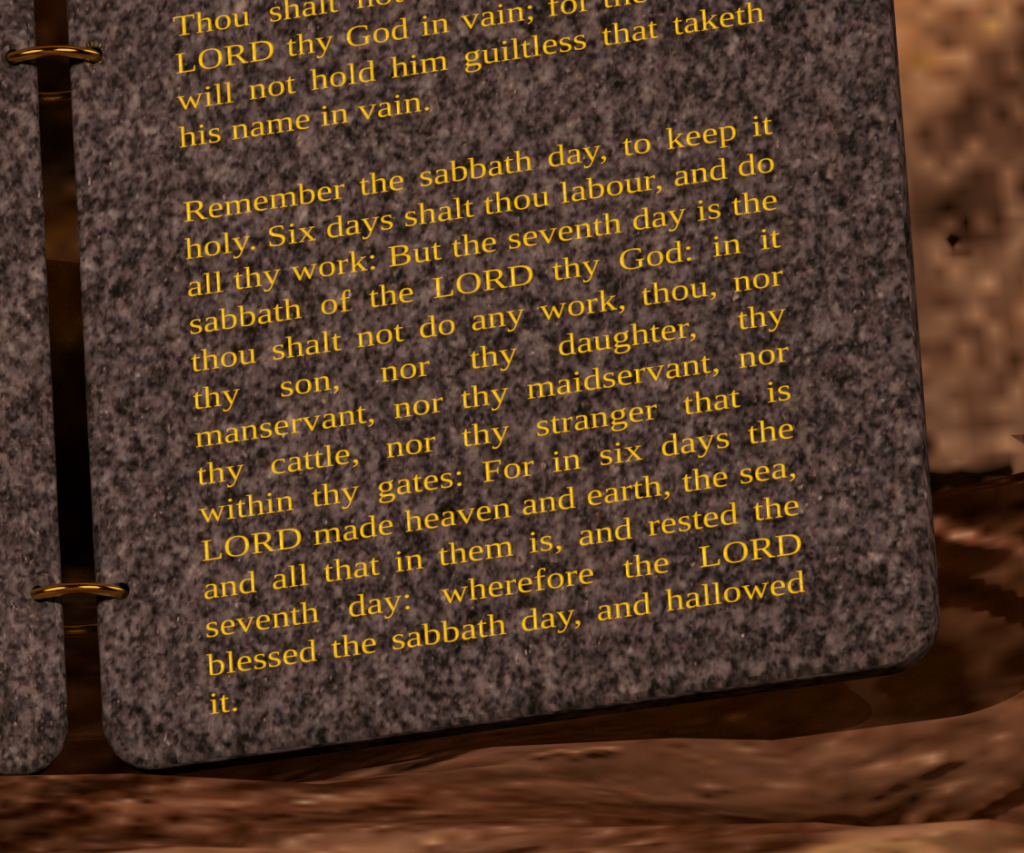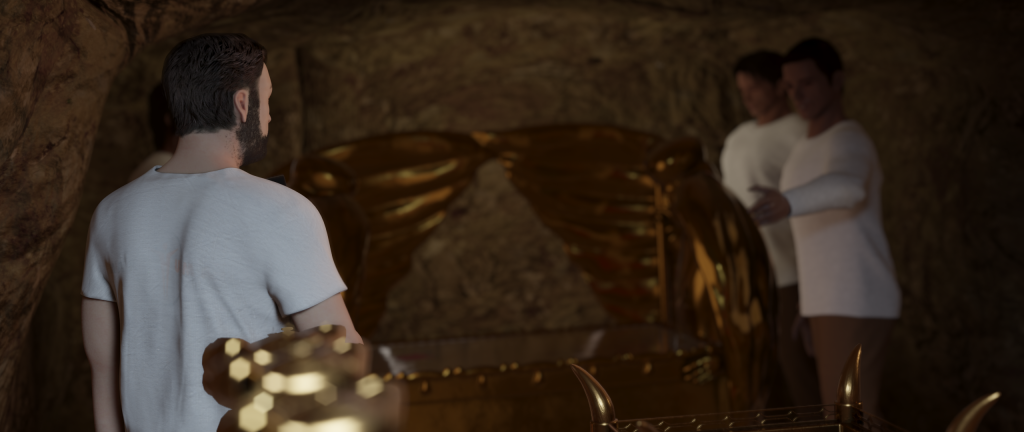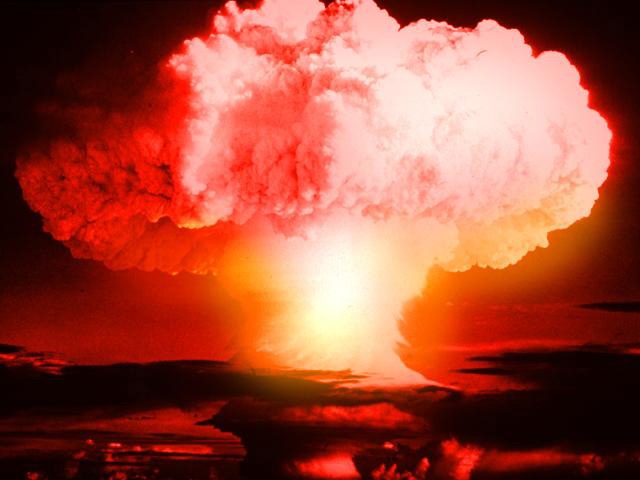Understanding the plagues.
If we want to understand the meaning of the plagues mentioned in Revelation, we need to do as before, seek answers in the Law and in the Prophets, The Old Testament. In the Bible, nothing is random or without a deeper significance that is possible to discover if we search the scriptures. The harsh plagues coming over the earth mentioned in Revelation chapter 16 has its explanation in the Old Testament and with that explanation, we are told who gets them and why. It also tells who will avoid them. This is essential information to avoid being among those destroyed during the plagues. Again remember, the book of Revelation is written to “Christ servants”.
Two of the reasons behind the plagues:
Revelation 18 explains why the plagues are sent, it says: “Come out of her, my people, that ye be not partakers of her sins, and that ye receive not of her plagues.” (Rev.18,4)
It’s not so much being inside a physical city that is the problem, we are asked to “leave Babylon” so we won’t be tempted to “take part in her sins”. It’s the sins that are the problem.
It’s the sins that cause us to be afflicted with “her plagues”. In 1. John 3,4 says, “sin is the transgression of the law”. By this, we, therefore, know that the sins we are not to partake in equals breaking of the law. The meaning of Revelation 18,4 is, therefore “come out of her my people, that you don’t partake with her in breaking My law so that you won’t get the plagues that will come to those who do.”
In God’s law, it was already written that breaking the law would result in plagues. But only after a certain event, an event I will get to in a little bit.
But first, let’s look at the two main principles of the plagues. One is their sins against God’s law, the other is their sins against God’s people.
The first we are told in Revelation 18:
“For her sins have reached unto heaven, and God hath remembered her iniquities. Reward her even as she rewarded you, and double unto her double according to her works: in the cup which she hath filled fill to her double” (Rev 18:5-.6)
Here we are told that the plagues are also tied to vengeance, to do to them what they did or wanted to do to God’s people.
From Revelation 13 we learn two major sins that will be done against God’s people in the end times. It tells us about a deceiving “beast”-power fornicating with Babylon and their attack on God’s people:
1) “and cause that as many as would not worship the image of the beast should be killed” (v.15).
2) “And that no man might buy or sell, save he that had the mark, or the name of the beast, or the number of his name” (v.17).
The first declares that those who won’t follow the image of the beast don’t deserve life. God, however, has decided that those who follow Him before the beast, the same group that they say deserve death, is the group that is to “inherit the earth” (Mat.25:34, Rev 22:14). But the beast claims those who do not obey his standard deserves death.
The second attack made against God’s people will prevent them from getting food and life necessities. In today’s modern world, without the ability to trade, it means you will have problems providing for your needs. Most do not have farms where they can sustain themselves, and even then, even seeds have been modified and copyrighted. Those who had farms in the old days were still depended on trade to get all their needs and today is no different. Most people, however, are totally depended on an income and being able to buy their food. Even water accessibility today is tied to trade. Few have their own wells. And most properties follow tax, today no one is completely independent. Refusing God’s faithful the right to trade unless they turn their faithfulness towards man’s rules conflicting with God’s law, is practically taking from them the right to live. This is a great provocation towards God who has promised that those who choose Him will have the right to eat, drink and prosper on the earth.
In the plagues we, therefore, see God turn the power around and destroy their livelihood instead. Giving them what they gave. “Reward her even as she rewarded you…in the cup which she hath filled fill to her double” The earth belongs to God and His faithful and refusing God’s people the right to live is a rebellion God will not close His eyes too.
In one of the plagues, the food from the ocean will be taken from them: “every living soul died in the sea.” (Rev.16,3) Seafood is the livelihood for millions, when it’s taken away there will be great tribulations. The next that will be taken away is food-resources from the land when the sun dries it all up: “And the fourth angel poured out his vial upon the sun, and power was given unto him to scorch men with fire. And men were scorched with great heat and blasphemed the name of God, which hath power over these plagues: and they repented not to give him glory. ” (Rev.16,8-9)
They have refused to acknowledge that God is the one who had the power to make the crops grow, to sustain animal life, that all they had was a blessing from God. That they are not gods. But it says that even when they see their own weakness to sustain themselves without God’s help they still won’t acknowledge God as the Creator. According to scripture, all blessings will be removed. The men who had claimed God’s people had no right to their livelihood and that they were in charge of the blessings in the world God takes it from them:
“The field is wasted, the land mourneth; for the corn is wasted: the new wine is dried up, the oil languisheth. Be ye ashamed, O ye husbandmen; howl, O ye vinedressers, for the wheat and for the barley; because the harvest of the field is perished. The vine is dried up, and the fig tree languisheth; the pomegranate tree, the palm tree also, and the apple tree, even all the trees of the field, are withered: because joy is withered away from the sons of men.” (Joe 1:10-12)
Under the plagues God also takes away their drinking sources: “And I heard the angel of the waters say, Thou art righteous, O Lord, which art, and wast, and shalt be because thou hast judged thus. For they have shed the blood of saints and prophets, and thou hast given them blood to drink; for they are worthy.” (Rev 16:5-6)
Again remember their crimes: “Reward her even as she rewarded you…in the cup which she hath filled fill to her double”
The plagues are not a random act of wrath, they are a result of God righteousness judgments. Yet they refuse to understand, they refuse to repent.
The other explanation for the plagues:
The other aspect of the plagues is tied to God’s law. The plagues are actually tied to a curse God gives for breaking God’s law. This is how we know and can prove that those worshipping the beast and its mark (who are afflicted by the plagues) are actually people defying God’s law.
The first plague mentioned in Revelation is the following:
“And the first went, and poured out his vial upon the earth; and there fell a noisome and grievous sore upon the men which had the mark of the beast, and upon them which worshipped his image” (Rev.16,2).
In the curse God gives to those who make the decision to reject God’s law after being educated, it says:
“But it shall come to pass, if thou wilt not hearken unto the voice of the LORD thy God, to observe to do all his commandments and his statutes which I command…
The LORD will smite thee with the botch of Egypt, and with the emerods, and with the scab, and with the itch, whereof thou canst not be healed” (Deu. 28:15 & 27)
Now Revelation 18 says those who take part in Babylons sins will take part in her plagues. But at the same time, God tells us that those who will not worship the beast and it’s mark are those that “keep the commandments of God and the faith of Jesus”. (Rev.14,12) They are the ones who escape the plagues. So the plague is, according to the law, a plague that comes from defying God’s law, and those who are exempt respect God’s law. In this way, we can see that the book of Revelation and the Torah (Books of the Law) are in perfect harmony.
The following promise was given God’s commandment keeping people in the law: “And the LORD will take away from thee all sickness, and will put none of the evil diseases of Egypt, which thou knowest, upon thee; but will lay them upon all them that hate thee. ” (Deu 7:15)
One of the plagues God sent upon Egypt was this evil sore as mentioned in the curse. “The LORD will smite thee with the botch of Egypt”
And so the law explains Revelation, and that book of Revelation keep referring to the book of the law all over. The book of Revelations contains numerous references to the Torah, including the tabernacle and all its holy items. And they both say that this type of sore will be given those who after knowing God’s standard chose disobedience while those who obey God will be delivered from it. This is exactly what Revelation confirms will take place in the last judgments. The problem for many is that they have separated Revelation from the Torah and adding guesswork instead, missing the most important lessons in the revelation from God.
The other curses for defying God’s law is not getting the blessing of water (Deu 28:24). In addition, we learn of the following curse:
“Cursed shalt thou be in the city, and cursed shalt thou be in the field. Cursed shall be thy basket and thy store. Cursed shall be the fruit of thy body, and the fruit of thy land, the increase of thy kine, and the flocks of thy sheep.” (Deu 28:16-18)
This means that the animals will get sick and be full of illnesses, the crops will fail. God will remove His blessing from all their food sources.
Even the wild animals will die as part of the curse: “Therefore shall the land mourn, and every one that dwelleth therein shall languish, with the beasts of the field, and with the fowls of heaven; yea, the fishes of the sea also shall be taken away. ..seeing thou hast forgotten the law of thy God, I will also forget thy children” (Hos.4,3 & 6).
While during the plagues the sun will: “scorch men with fire” (Rev.16,8)
The opposite promise is given to God’s people “The sun shall not smite thee by day” (Psa 121:6)
Another curse and plague is darkness. The curse: «And thou shalt grope at noonday, as the blind gropeth in darkness» (Deu 28:29) The plague: «And the fifth angel poured out his vial upon the seat of the beast; and his kingdom was full of darkness» (Rev 16:10)
Part of the punishment also included war, in the sixth plague we will see the forming of a great war, but they are striving with God and God will win the battle.
However, notice this detail of the curse given to those who oppose God’s law:
“And thy carcase shall be meat unto all fowls of the air, and unto the beasts of the earth, and no man shall fray them away.” (Deu 28:26)
God says the end curse of rejecting His law is that the dead bodies will be given to the birds in the air.
This is exactly what the book of Revelation says is going to happen to those who followed the beast:
“And I saw an angel standing in the sun; and he cried with a loud voice, saying to all the fowls that fly in the midst of heaven, Come and gather yourselves together unto the supper of the great God; That ye may eat the flesh of kings, and the flesh of captains, and the flesh of mighty men, and the flesh of horses, and of them that sit on them, and the flesh of all men, both free and bond, both small and great” (Rev 19:17-18).
For many who have been taught that the law has been done away and is no longer binding, it might seem strange that the future plagues and punishment mentioned in the New Testament are actually a curse for rejecting God’s law. And the Bible does give us the explanation. And for many, the explanation is a shock. They will discover they have been lied to.
You see God doesn’t change, His word still stands. Another unquestionable evidence we get that the plagues are tied to the breaking of God’s law is the fact that the angels that carry these vials to earth are actually sent from the Ark of the Testament/Covenant (the Greek word for testament and covenant is the same, it’s just translated differently to English).
“And after that I looked, and, behold, the temple of the tabernacle of the testimony in heaven was opened: And the seven angels came out of the temple, having the seven plagues” (Rev 15:5-6)
The temple, the Ark, takes part in judging the world. That is a Biblical fact.
Firstly because of the rebellion against God’s law and secondly because of their attack on God’s people.
The world has at the time prior to the plagues reversed God’s judgments. While God promises that those who are obedient to Him will inherit the land, prosper, have their needs while those who don’t will be under a curse, the beast, and his followers have claimed blessings to those who defy God’s authority and physically removed the blessings from those who obey God.
To many Christians, these curses are only tied to the people of Israeli descent, the ones God made the covenant with. Yet in Revelation we see the whole world partaking in these very curses and only those who have the commandments of God and the faith of Jesus are spared the destruction. How can God judge all mankind after the law?
Remember, the Ark took part in judging Jericho, that rejected God as lawgiver. They took the law around the city for 7 days before judging the city. The Ark is not an item belonging to Israel, it belongs to God Himself and represents His kingship and ownership of the planet.
That is why it says: “the ark of the covenant of the Lord of all the earth” (Jos.3,11). God is the creator of all and His standard, wheater we believe it concerns us or not, is what we will be judged by. The Ark’s presence at the outpouring of the plagues confirms this fact.
Israel reminded of the covenant at Mount Ebal and Gerizim
“And it shall come to pass, when the LORD thy God hath brought thee in unto the land whither thou goest to possess it, that thou shalt put the blessing upon mount Gerizim, and the curse upon mount Ebal” (Deu 11:29).
Israel followed this command. They crossed the Jordan river and later went up to Ebal.
“And all Israel, and their elders, and officers, and their judges, stood on this side the ark and on that side before the priests the Levites, which bare the ark of the covenant of the LORD, as well the stranger, as he that was born among them; half of them over against mount Gerizim, and half of them over against mount Ebal; as Moses the servant of the LORD had commanded before, that they should bless the people of Israel. And afterward he read all the words of the law, the blessings and cursings, according to all that is written in the book of the law” (Jos.8:33-34).
The Ark of the Covenant, in this particular situation, was taken to this place and was centered between the people. It served as a witness of the covenant God had made. They were told that the two mountains were to represent the blessings for obeying the law and the curses for rejecting it.
In the Bible, a mountain is often a symbol of a “kingdom”. And this is just the situation we see in the end times with the beast and his followers on one side afflicted with the curses written in the law, and those who remain faithful to God on the other side, they who keep both the law and have the faith of Jesus.
The purpose of this practical illustration at Mount Ebal and Gerizim was to enlighten the people of their two options, to let them fully understand the consequences of their actions and decisions. They were to openly and with their heart chose their path.
About the occasion, it says: “There was not a word of all that Moses commanded, which Joshua read not before all the congregation of Israel, with the women, and the little ones, and the strangers that were conversant among them.” (Jos 8:35)
Joshua enlightens the people of the covenant that God had made with them. He lets them know what obedience will lead to and what disobedience will lead to.
This is an important principle we see in the Bible repeated over and over again. God enlightens people about their options and warns them of the consequences that come from making the wrong decision. God was thural in letting them know the curses from defying God and breaking God’s law.
And so before these curses could be sent over the people that later were disobedient, they had to have been told beforehand of the risks of their decision.
God never changes, He is the same today and always.
The curses coming over the world in the end times, as shown in the plagues, do not come without the world first being enlightened with the cursings and blessings connected to their decisions.
In Revelation, we learn just that principle will be repeated. Before God’s people are told they will receive the plagues if they commit the sins of Babylon, we see the whole world being enlightened by a mighty angel. In the Bible, an angel is another word for a messenger or a mighty message. “I saw another angel come down from heaven, having great power; and the earth was lightened with his glory” (Rev.18,1). Mankind will be enlightened before God returns, and God will use His chosen methods to do this.
One of these educational messages might just be the revelation of the Ark. Last time the Ark was in the middle and part of the enlightenment. Will the Ark come back into the picture to present the world with its options and the consequences of disobeying God? All biblical logic says the world will be presented with the blessing and the curse before the curse will fall upon them. And the Bible also says that the Ark has a place in such a display, even in the past.
The two mountains of Ebal and Gerizim represents the same two choices we see in Revelation 13, 14, 18 .
The Ark will present the world with God’s covenant with mankind. The law and the blood of Christ represent God’s covenant, if we reject either one of the two or both we have placed ourselves in alliance with the beast. And with that alliance, God warns us, the curses of the law will come upon us.
But if we chose obedience to God, the blood of Christ will preserve us from the curses of the law and we will instead receive the blessings.
God’s reveal of the law and the blood at the end of time is God bringing before every human being the two mountains, the two kingdoms, the two options. One that brings the curse, the other that brings the blessing.
And we will be asked to make a decision. And that decision that we will take will determine if we will be struck by the curse, that the plaques are.
What side will you take?
But wasn’t the law and the curse done away with at the cross?
Jesus warned us beforehand: “For many shall come in my name, saying, I am Christ; and shall deceive many” (Mat 24:5).
We will encounter the devil pretending to be Christ in the end time. As he will struggle to destroy the mighty evidence God will bring before man, he has only one thing he can do to possible presumably top God’s revelation. He will pretend to be Christ and tell you “in the image of Christ” that his living word is greater than that revelation from the cave. And that you are not required to keep the law as it was once written. He will offer you the blessing with the disobedience, just like he did with Eve. But God’s word stands fast. And by the words from this Christ-manifestation, you will know if it’s the serpent in his disguise or not. The real Jesus is not in conflict with God’s law, that would make Him the rebel. He is not the rebel, He is a priest before God’s throne bringing blood before the law as evidence that the demands of the law have been respected. Jesus is one with His father.
Eve thought she would be spared the curse when she was eating the fruit in the Garden because the serpent told her it would bring a blessing instead.
But he lied to her. God has said: “My covenant will I not break, nor alter the thing that is gone out of my lips” (Psa.89,34).
Likewise, there are many that come in Christ name saying they are “Christos” also meaning “Christian”. And many claiming to be Christos, Christians, deceive many. They say you can freely continue to break God’s law and still escape the curse. They will tell you the law is done away with at the cross. It is true that Christ has taken the curse away from those who partake in the blood. Or else everyone would receive the plagues, for all have sinned. The curse is removed from those who have taken part in the blood of Christ.
The blood is, however, not permission to continuing defying God and violating His law. The blood is only the means of escape from the curse to the one who has repented and turned away from their rebellion against God’s law.
The blood is not given as a weapon for rebellion against God’s law. It’s a gift to the broken-hearted sinner, a second chance.
Those who have not given their sins and rebellion to Christ on the cross will not be spared of the curse, they will have to take the punishment themselves.
This principle is shown in the sanctuary service, the only one who got their sins taken away was they who by their own free will came before the tabernacle with the sacrifice, transferring their sins upon the head of the substitute by confessing and repenting and acknowledging God’s right to judge, and then the substitute took the curse in the repentant sinners place. The only way to escape the curse is to partake in a private covenant with God.
The offer of salvation is given to all of mankind, and that is why the discovery of God’s law with Christ blood serves as a loving final offer to mankind to turn from their ways, take part in the sacrifice and end their rebellion. Their past transgressions, the curse, has been taken from them and on to the cross. Every human being on planet earth has the opportunity to escape and let Christ death be for their sake.
But for those who abuse Christ name, for those who continue the rebellion and for those who reject God’s offer to save and heal you,
they will, according to every book in the Bible, have to take the punishment themselves. This punishment is being cursed by the law and ends with the death penalty. This is perdition. If this wasn’t the case some of the worst dictators that ever lived will be invited to heaven. God has to keep the validity of the law in order to judge and sentence the ungodly who refuse to change (1Ti.1:9). That is why we see it present in the book of Revelation taking part in the judgment of man.
So we have a choice. An amazing offer. And we can choose, spite our past wrongdoings, to take part in the blessing that Christ was rewarded with when He fully lived out God’s law. He is willing to take our curse and give us part in His blessing. But only if we repent and accept God’s authority.
The false Christ and/or deceiving Christians will promise you that you can take part in the blessings and be exempt from the curse even if you continue to rebel against God’s laws and precepts.
Of such Jesus said warned us beforehand: “Many will say to me in that day, Lord, Lord, have we not prophesied in thy name? and in thy name have cast out devils? and in thy name done many wonderful works?
And then will I profess unto them, I never knew you: depart from me, ye that work iniquity” (Mat 7:22-23).
The word “iniquity” is the Greek word “anomia” which literally means to be in violation of the law (nomos). And so Jesus warns us beforehand that many will come in Christ name who seemingly have done many mighty works in Christ name but have preached in life and word that we could be free from God’s law (Mat 5:19).
This is a false gospel that leads many people in perdition.
“Let no man deceive you by any means: for that day shall not come, except there come a falling away first, and that man of sin be revealed, the son of perdition” (2Th 2:3)
Remember again, the Bible says sin is just another word for breaking God’s law. And so the “man of sin” is in other words “man of breaking God’s law”, yet it continues to say: “Who opposeth and exalteth himself above all that is called God, or that is worshipped; so that he as God sitteth in the temple of God, shewing himself that he is God.” (v.4) When God sits in His temple He sat over the Ark containing His law and commandment telling His jurisdiction included earth. So the “man of sin” is not just another man breaking God’s law, it’s a man who places “exalteth himself” over God by placing his authority seemingly above Gods by legalizing to breaking God’s law. It’s a spiritual leader who places his law in place of God’s law, and the verses say he does it by “deceivableness” (V.10) And it says about him “For the mystery of iniquity doth already work…” (v.7) Here again is the same word “anomia” The mystery of anomia(iniquity), meaning the mystery of breaking God’s law.
That is just what has happened, religious leaders have for hundreds of years convinced Christians to keep the church traditions and regulations before God’s commandments and that God’s commandments are no longer in authority. They have placed the church and man above God under the guise of righteousness.
Inside the fourth commandment of God, the Sabbath, it says God can make these laws because He is the Creator. But this commandment has by the church been replaced by a tradition claimed to be in God’s honor. But the Bible is clear, we honor God by respecting His command not by making competing ones and then persecuting those who keep God’s command.
The devil is in the churches: “For such are false apostles, deceitful workers, transforming themselves into the apostles of Christ.
And no marvel; for Satan himself is transformed into an angel of light. Therefore it is no great thing if his ministers also be transformed as the ministers of righteousness; whose end shall be according to their works” (2Co 11:13-15).
The serpent is no longer in the tree, he is in the church trying to distort the gospel and the scripture and convince Christians that the law is no longer binding. That they will be even blessed by disrespecting it and replacing some of its requirements with their own rules and regulations. But the ability to make religious laws and to make something holy is reserved for God and not for man. Anyone who takes this position is exalting himself over God. But it’s self-deception. The Bible continues to tell us who will be fooled by this lie: “And for this cause God shall send them strong delusion, that they should believe a lie: That they all might be damned who believed not the truth, but had pleasure in unrighteousness” (2Th 2:11-12).
They who believe this lie has pleasure in rejecting God’s laws. They don’t love Christ righteousness, which is the law. Jesus is the “truth”, Jesus is also “the word made flesh” (Joh.14,6 & 1,1). The living version of the law. If we reject Christ righteousness which is His obedience to God’s law, we do not really love the truth. (Joh.15,10; Psa_119:142, Isa_42:21, Rom_2:26, Rom_8:4, Rom_10:4, Isa_51:7)
The way the devil planted the lie of lawlessness in the churches was by twisting Pauls letters just like the Bible warned us against doing (2Pe 3:15-16). Paul spoke of self-righteousness, he spoke against trying to keep the law by our own strength rather through faith. He also spoke against the ceremonial laws many continued to keep and that no longer were needed after Christ brought the ultimate sacrifice by His death.
The letter was written at a time when the temple service continued as before. It was written when people were debating on how the law could be written on our hearts and not if it should be (Heb.8,10). But the devil used time and twisted every meaning and put it in a new context. Suddenly he managed to fool Christians into thinking Paul spoke against keeping the Sabbath that honored God as a creator, that he spoke against God’s laws against making idols and other laws that many Christians have rejected.
They were misapplied to a new era and a constructed conflict. No longer was it about how the law could be fulfilled in our hearts so we could stop turning back to our old sins and by it come under the curse of the law yet again. (Gal.4:8-9; 2Ti 3:5, 2Ti_4:4, Tit_1:14)
“Know ye not that the unrighteous shall not inherit the kingdom of God? Be not deceived: neither fornicators, nor idolaters, nor adulterers, nor effeminate, nor abusers of themselves with mankind. Nor thieves, nor covetous, nor drunkards, nor revilers, nor extortioners, shall inherit the kingdom of God. And such were some of you: but ye are washed, but ye are sanctified, but ye are justified in the name of the Lord Jesus, and by the Spirit of our God” (1Co 6:9-11).
The name Satan is really a description of his mission. The word originally used in the Old Testament for Satan is “śâṭân” which means opponent or śâṭan which means to accuse or resist.
Satans rebellion against God has always been against God’s rule, His laws, and authority. That is what he is attacking. That is why he made Eve go against God’s law and that is why he is trying to make christians violate it as well. Knowing well he will fail making himself knowing he transfers himself to an angel of light, his workers to workers of rightousness, he helps “the man of sin”, religious leaders into their position where they can rule over God’s people and lead them away from obedience to God’s athority so that they once again fall under the curse of the law while having the illusion that they will be saved. But Jesus warned and said He would one day claim He never knew them if they chose to believe this lie.
Instead, the devil now made it about the law itself being bad and needing to be removed. Rather our sins/breaking the law being the wrongdoing, he convinced Christians under the guise as their leader, that the problem was, in fact, the law and not the breaking of it. And that is why God removed the law by the blood of Christ rather confirming it by fulfilling its requirements. A dangerous deception leading Christians into perdition.
It is in part to expose this false gospel God has planned to reveal the Ark of the Covenant with Christ blood upon it.
God knows that many are sincere and have been fooled. They have not learned the truth. They have since childhood been taught to read the Bible in this deceptive way and they don’t know the danger they are in. His sympathy is also with the rest of the world who knows not of the salvation they can obtain through Christ blood or who doesn’t even know about God’s standard for mankind.
This discovery preaches the correct gospel in a simple and illustrative way. The blood was shed above the law showing what law was part of God’s covenant with man, and what law we are required to keep. It shows that Christ offers us pardon from breaking this law, but at the same time, it reveals that the law is part of the New Covenant with all of mankind.
God gives the offer of the blood to the repentant sinner. You have to confess you have sinned. This required a confession that we know we have broken God’s law and we agree to it being wrong. The sinner who does not wishes to acknowledge God’s law as just and in force cannot take part in the blood.
The false gospel says that the law was done away with at the cross. But if that is the case, God, by doing away with the law, also did away with the definition of sin. If there is no law there is no sin. Nor is there a “man of sin”. The judging of the earth and the ungodly cannot take place. This is the teaching of lawlessness and iniquity and of the man of sin.
If the law could be done away with Christ didn’t have to die. The law could just be removed and no sinner could be judged. There is no rule in the law that says if someone dies the law can be destroyed. The only rule says that the accusation or curse directed on the transgressor can be removed if there is a substitute to take the penalty. Every symbolism in the rituals God’s gave explained this same principle over and over again.
God didn’t destroy His law. Instead of removing the law, He validated it by sending His son to take our place in the punishment.
By letting the law get its requirement is confirming the validity of the law.
When a man is sentenced in any courtroom in the world, the judges by the sentencing also confirms that the law he was judged by is still valid. Sentencing and confirming the law is the same thing. Jesus dying in our place is Him confirming the law’s validity, it’s right to judge, it’s rightful existence, that it’s in force.
If God had removed the penalty for sin, He would by that very action have destroyed the validity of the law. But instead of removing the penalty for trasgression, he transferred the transgression to a substitute and had Him fulfill the requirements of the law in our place. The requirement of death. But we still need to, after this great sacrifice, to turn from our ways and back to obedience to God. Or else Christ sacrifice is of no help as we will just be under the condemnation once again. “If they shall fall away, to renew them again unto repentance; seeing they crucify to themselves the Son of God afresh, and put him to an open shame” (Heb_6:6). If we willingly go in the idea that Christ dying for us means we can just continue to violate the law and reject its principles we put Christ to “open shame”.
This is the devils’ gospel. To rebel against God’s law, to put man in the place of God by placing traditions and commandments of God above or sometimes in place of God’s command, and to use Christ sacrifice as means to violate the law(means to sin).
And while doing all of that, raising our hands and praising God as if He would accept us spite our continues rebellion. Satan once deceived the people of Judah with the same lie, and it ended with God leaving the temple and letting Jerusalem be destroyed:
“And when ye spread forth your hands, I will hide mine eyes from you: yea, when ye make many prayers, I will not hear: your hands are full of blood. Wash you, make you clean; put away the evil of your doings from before mine eyes; cease to do evil; Learn to do well; seek judgment, relieve the oppressed, judge the fatherless, plead for the widow. Come now, and let us reason together, saith the LORD: though your sins be as scarlet, they shall be as white as snow; though they be red like crimson, they shall be as wool” (Isa 1:15-18).
The devil has twisted the gospel to make it seem like Jesus action on the cross did away with the validity of the law, something that is both illogical and unbiblical. And the only author of the Bible used to twist the gospel in such a way is Paul, the only Biblical author the Bible itself warns us against misinterpreting. It says the misunderstanding of him can lead us into perdition.
Paul is not a lawgiver or have the authority to give or take away a law. He is just trying to explain that the sacrificial rituals that were still being practiced while he wrote his letters, where no longer necessary when we had Christ, as His blood is the only blood that can save us. He also tries to explain the right and only way to become in harmony with God’s law. By faith, by the spirit and not by our own strength and accomplishments. When we try to be good we usually fail, but by the power of God and His spirit, we can succeed. And when we do, credit goes to God and not to ourselves.
God has only offered us one way out, only one possible salvation to flee the curse. To repent for having broken God’s law (sinned) and seek pardon through Christ blood. The law and the blood.
The only ones who will escape the curse that will fall on mankind in the end times are described as those still obedient to God’s authority and who are no longer rebelling against God’s law.
Can this be said about you? Are you among them? You still can be.
Yes many have been deceived: “For all nations have drunk of the wine of the wrath of her fornication” (18,3)
“And the great dragon was cast out, that old serpent, called the Devil, and Satan, which deceiveth the whole world …And the beast
…the dragon gave him his power …And all that dwell upon the earth shall worship him”
(Rev. 12; 9,13; 2,8) The whole world has fallen for the devils lies through his allies. The majority of Christians believe the lie of ‘anomia’ already.
Who is the devil out to silence by his deception? Whom does he fear? The very ones who have not accepted his lies:
“And the dragon was wroth with the woman and went to make war with the remnant of her seed, which keeps the commandments of God, and have the testimony of Jesus Christ. …And it was given unto him to make war with the saints …And that no man might buy or sell, save he that had the mark, or the name of the beast, or the number of his name. …Here is the patience of the saints: here are they that keep the commandments of God, and the faith of Jesus”. (12:17, 13:7 & 17, 14:12)
Jews still under the curse of the law
What about jews, many of them respect God’s law? Will they be spared the curse of the law (the curse of the law = being under the law)? The devil has made sure to fool also them among the Jews that respect God’s law by taking from them the blood of Christ.
A jew keeping the law is still under the curse because every man has “sinned” and broken God’s law, even jews claiming to keep it. And if they don’t have an atonement for their sins they are under the curse of the law even though they try to keep it.
And so jews are also under the curse of the law unless they accept Christ as their savior and atonement.
A Christian who claims Christ blood but continue to disrespect God’s law and a jew who respect God’s law but have no atoning blood are both under the curse of the law. They will both suffer the plagues if they do not repent. Because no one can be saved or atone for past sins by keeping the law. The law itself does not pardon anyone or save anyone from the curse. A good deed cannot cleanse away a bad deed.
It is very logic in everyday society, but people lose their logic when reading the Bible because the devil is confusing them. In every society that has laws a man who kills his neighbor will not be acquitted from this transgression in a court just because he saved another man from drowning. He will still have to pay the penalty for his transgression. It’s the same with God’s law. We cannot remove our sin for breaking one law by keeping another. Good deeds or obedience doesn’t remove past disobedience. We are still under the law. A fugitive who starts a new life and live like a saint will one day be caught by police and their good life will not acquit them from the judgment once made against their bad deed. They still have to go to prison. The only thing that can take the demand of the law from us is our substitute in our trial, Jesus Christ.
Of these things Paul wrote a lot about as he saw the danger, the Jews were in for rejecting Christ atonement. It’s these warnings many have misapplied and used against the validity of the law. But Paul only explains that the righteousness of the law cannot blot out sin, and that is why they need Jesus. This has been interpreted that Paul speaks against obedience to God’s law and that keeping the law competes with the gospel. But this is not what Paul is really saying.
Jews that claim to keep the law are therefore also under the curse.
There is no doubt what the two sides are.
Don’t believe the devils lies that the last conflict is about technology, Islam, Judaism, communism or atheism. Don’t be diverted into making this about anything but the core of the conflict.
There is only one great enemy who can destroy you and that is you if you chose to oppose God.
But if you chose the blessing God will be your King and your protector as He has promised to those who seek refuge under His king’s rod and by His throne. He will fight your enemies and your water and bread will be sure. You will be covered by Christ righteousness and your sins will be atoned by Christ blood.
You will get Christ earned blessing just as He took your curse.
This gift can be yours today if you repent. Even if you haven’t to this day kept God’s law, the blessing as if you had kept them can be yours. You just have to stop the rebellion and turned to your Father.
Last deception
As the world sees everything falling apart as a result of their transgression and rejection of God the devil will come up with a solution that will make everything worse. The solution is turning back to God and His law and authority. The devil will suggest for world leaders and religious leaders to give God glory by creating laws to His honor.
The idea that God will be honored by their legislation is another lie. God is only ever honored when we honor His legislation. When we make our own that compete and even allows the breaking of God’s, God is not honored no matter how much we claim that is our attempt.
The whole world will come together in honoring this legislation thinking God will be convinced by the multitudes, by the togetherness. He also commands His people to not be moved by multitudes: “Thou shalt not follow the multitude to do evil; neither shalt thou speak in a cause, following many, to divert judgment” (Exo.23,2). God’s law is not established through democracy but through a theocracy.
God rules an entire universe. Mans legislations that replace His legislations are still rebellion and will not save them from the curse of the law.
God had sent His son to die before adjusting to a single title of the law. He made the great sacrifice of risking His son rather freeing mankind of His law and the consequences for breaking them. If would rather send a substitute to take the penalty then to remove the law.
Mankind has listened to Satans lies and rebellion against God’s law. Even though they in their blindness think they please God they are really pleasing God’s enemy. The curse will not be removed.
When the devil under the guise of “Christ” claims the problem isn’t their legislation to God’s honor but those who continue to keep God’s original law and they set themselves to attack and destroy those who are obedient, their fate is sealed.
They have gone too far. They knew the truth, God had shown them the truth, and when they were presented with the lie they chose the lie over the truth. Because they loved not the truth.
Christ battle for the Sabbath.
Among the Devils, lies are the lie that Christ was fighting against the Sabbath when He was here on earth. This view has made way for the idea that it was time to make a change and remove this law and replace it with one tied to Christ resurrection instead.
The Sabbath was given at creation to all mankind, it was a law given before sin tying the bond between the Creator and the planet. Sabbath has, therefore, unlike the devils lies, nothing to do with the sacrificial law that came as a result of sin. The Sabbath was independent and part of paradise and God’s perfection.
In the Sabbath commandment written down on the tables placed into the Ark of the Covenant, it says: “Remember the sabbath day, to keep it holy.
Six days shalt thou labor, and do all thy work: But the seventh day is the sabbath of the LORD thy God: in it thou shalt not do any work, thou, nor thy son, nor thy daughter, thy manservant, nor thy maidservant, nor thy cattle, nor thy stranger that is within thy gates: For in six days the LORD made heaven and earth, the sea, and all that in them is, and rested the seventh day: wherefore the LORD blessed the sabbath day and hallowed it” (Exo 20:9-11).
Now notice the words “the LORD MADE heaven and hearth… and all that in them is.. and rested the seventh day”.
Who did all of this work? According to John, it was none other than Christ Himself: “All things were made by him; and without him was not any thing made that was made” (Joh.1,3).
When the Pharisees questioned Christ divinity He followed up with His speech regarding His preexistence and being that great I AM that spoke to Moses by making a practical example exposing of His identity. Jesus had first linked to name “I AM” to Himself: “Jesus said unto them, Verily, verily, I say unto you, Before Abraham was, I AM (Ego Eimi). Then took they up stones to cast at him: but Jesus hid himself…” (Joh 8:58-59)
I AM was the One who had met with Moses: “And God said unto Moses, I AM THAT I AM: and he said, Thus shalt thou say unto the children of Israel, I AM hath sent me unto you” (Exo 3:14).
Right after Jesus had used these words on Himself to the scribes and they tried to stone Him, He did this practical example when walking up to a blind man:
“When he had thus spoken, he spat on the ground, and made clay of the spittle, and he anointed the eyes of the blind man with the clay…” (Joh 9:6-7).
This act was the same he wants did with the first human. “And the LORD God formed man of the dust of the ground and breathed into his nostrils the breath of life” (Gen 2:7)
Forming clay with His spit and then shaping them and placing them upon the man’s eyes was Christ showing them who He really was. The same who had formed Adam from the dust of the ground.
It was Jesus who had shaped the world and everything on it, in His father’s presence, who rested on that first Sabbath day and sanctified it.
It was Christ that gave Moses the law at Sinai telling them to remember the Sabbath to keep it as a memorial of His authority as Creator.
Jesus had said to the jews: “And he said unto them, Ye are from beneath; I am from above: ye are of this world; I am not of this world. I said therefore unto you, that ye shall die in your sins: for if ye believe not that I am (Ego Eimi) he, ye shall die in your sins” (Joh 8:23-24)
Christ also had a specific additional purpose for the Sabbath. Because of all the false gods and later false Christs He gave a sign: “Moreover also I gave them my sabbaths, to be a sign between me and them, that they might know that I am the LORD that sanctify them” (Eze 20:12). “And hallow my sabbaths; and they shall be a sign between me and you, that ye may know that I am the LORD your God” (Eze_20:20).
It’s a sign not only that the Lord is our God, but that Jesus is our Lord and Creator.
Because the Sabbath was such an important symbol of God’s relationship with man through His Son it was very important that the Sabbath was not distorted.
When Jesus was here on earth He did not debate so much theology as He healed and comforted people. But one thing He did use a lot of time to address was how they were ruining this important day with their extra rules and regulations. The law itself had forbidden them to add to God’s law, still, they had done it (Deu.4,2). Jesus confronted the Pharisees over and over again with their distortion of the Sabbath, how they had changed it’s meaning and significance. Jesus did this because it was such an important law with such an important purpose that He could not leave their corruption of this holy day without correction. Several times Jesus chose to do His confrontations upon this very day. They had placed their traditions and interpretations over the word of God. Because the day represented God’s authority it was the worst day to tamper with in the sense of placing mans’ authority on it. Jesus used the term “Son of man” to describe Himself after His incarnation in human flesh: “Son of man hath not where to lay his head” (Matt.8,20) “But that ye may know that the Son of man hath power on earth to forgive sins” (Matt 9,6) These are only two of many examples. Jesus also said: “For the Son of man is Lord even of the sabbath day” (Mat.12:8). He here speaks of Himself. The word Lord is the Greek Kurious which means “supreme in authority”.
Jesus is supreme in authority over the Sabbath. The Sabbath itself states it’s day witnessing of the Creators authority. Jesus here either places Himself above His Father or He reminds them of who He actually is, the one who formed the earth and everything on it. Only then would he be supreme in authority, Lord over the Sabbath.
This also means that if Jesus is Lord of the Sabbath, as He says Himself, anyone else who places themselves as Lord of the Sabbath is a deceiver and opponent against Jesus.
Because the Sabbath belongs to Christ and was a sign between Him and His people and His capability to sanctify them, it was important for Christ to address how the Sabbath had been corrupted by the priests and scribes. The moment they placed their own laws into His sabbath they were trying to make themselves Lord of the Sabbath. It was a power struggle, and Jesus did not let it go without confrontation.
This is what Christ battle regarding the Sabbath was really about. But the devil who twist the Word of God to His favor in order to fool God’s people, have given them the idea that Jesus didn’t like the Sabbath and didn’t mind having it removed.
Jesus, when He had died for our sake, taking our curse upon Himself on the cross, rested on the sabbath day according to the gospel. After creation, He rested and after redemption, He rested on the same day. Then He rose on Sunday morning to continue the work for mankind on a feast He had ordained called the feast of first fruits (Lev.23,9-14). God didn’t replace the Sabbath with a new day, the few Sundays that events happened was a fulfillment of other feast God had ordained. These feasts were to compliment the weekly Sabbath but not take the place of it (Lev.23,1-3) Nowhere in the Bible does Christ followers reject the Sabbath for a new Sabbath day Sunday. This would have been a violation towards Christ person, identity and purpose. And it’s nowhere to be seen in the Bible.
It’s correct that the outpouring of the Spirit took place on a Sunday. But it wasn’t just any Sunday, it was on God’s ordained feast called the feast of weeks also called Pentecost or Shavuot. (Lev.23,15-22) On that day was celebrated a yearly law-ordained feast not a weekly Sabbath.
In the New Testament, we see that both Jews and Gentiles meet to hear God’s words preached on the Sabbath (Act.13:14, Act.13:42-44; Act 16:13; Act.17:2; Act.18:4). Nothing has changed regarding the day God set aside as Holy.
Jesus even defended His day when speaking of the destruction of Jerusalem and the earth. In His speech regarding the topic, He blends the two occasions together and says to them: “But pray ye that your flight be not in the winter, neither on the sabbath day” (Mat.24:20)
Jesus shows here clearly the expectation that His followers would continue to keep this day holy. It would still be there and valid long after His ascension to heaven, even long after the apostle meeting in Jerusalem. Not just in force, but that we need to pray that our flight won’t be on that day. Why? Because if we are fleeing for our lives on the Sabbath day we risk being tempted to break it in order to save our lives. This temptation could place us under the curse when we needed God’s blessings the most. Jesus tells that we need to pray in order to not end up in such peril that we will be lead to disregard the Sabbath for the sake of our own safety. The second peril of His people on the run was the winter and how the harsh climate could affect them and make them capitulate to the enemy. Jesus did not wish for them to end in a situation of temptation when they were in an even greater need to be at one with Christ than ever before.
It was clear that Jesus, the Lord of the Sabbath, needed His followers to continue to have the highest regard for the Sabbath.
How then did the church end up changing the Sabbath from the God-ordained day (Friday evening to Saturday evening) to a new day? They claimed they did it in honor of Christ, but if we honor Christ we let Him be the Lord of the Sabbath. Those who had tempered with His Sabbath in other ways had been rebuked. How then was Christ honored when His commandment to His honor, witnessing of Him as Lord, was changed and transferred to another day?
What should His followers say? I will not pray that my flight is not on the Sabbath, but I will pray that my flight is not on Sunday, for I have made that day the new Sabbath in honor of Christ”? Will we still be under the curse? We will still be under the curse.
Jesus said: “And why call ye me, Lord, Lord, and do not the things which
I say?” (Luk 6:46) According to Jesus, calling Him Lord and doing what He says is the same thing. If we don’t do what He says, by that action we reject Him as our Lord even if we call Him Lord.
Jesus had no respect for people replacing His commandments with their own traditions and ideas, even if it was in His honor “But in vain they do worship me, teaching for doctrines the commandments of men” (Mat 15:9).
When the world sets to make Sunday a day to honor God as the creator in hope of Him bringing salvation from the peril on earth, they are building their house on sand. “And every one that heareth these sayings of mine, and doeth them not, shall be likened unto a foolish man, which built his house upon the sand: And the rain descended, and the floods came, and the winds blew, and beat upon that house; and it fell: and great was the fall of it” (Mat 7:26-27).
Sunday-sanctification in place of Sabbath-keeping is a deception created by Satan Himself deceiving you to think you honor Christ when you are in fact spitting upon Christ authority. He deceives the world into thinking they will obtain God’s favor and blessings and that God will rid them of the curse that has come upon the earth by their religious legislation.
God is not honored, his enemy is. If Jesus is our Lord we will do what He says, we will honor the day He commanded and not a day humans have come up with to replace it.
Continuing to violate God’s law in favor of our own religious laws will bring no peace and prosperity on the earth. It will not heal the land. “For when they shall say, Peace and safety; then sudden destruction cometh upon them, as travail upon a woman with child; and they shall not escape.” (1Th.5:3)
Why did Satan especially attack the sabbath-day? Because it witnessed that the earth belonged to Christ and he claimed the earth was his and he Christ to worship him: “Again, the devil taketh him up into an exceeding high mountain, and sheweth him all the kingdoms of the world, and the glory of them; And saith unto him, All these things will I give thee, if thou wilt fall down and worship me” (Matt.4,8-10).
Every time someone comes to God in submission and worship on the sabbath day they reject the Devil as the owner of the planet and he hates it. The Sabbath was also a sanctifying bond, according to God Himself, a sanctifying bond the devil wanted to break.
Thirdly the devil only needed them to oppose one commandment of the law in order to achieve his goal of placing God’s people under the curse. It was more unlikely for him to convince any Christian that they were permitted to steal or murder or commit fornication. The Sabbath commandment was all about worship and didn’t seem to have any moral attached to it that could expose the devils lies to easily. And so attacking the fourth commandment under the guise of doing God service made it possible for the devil to attack the symbols he hated, Christ authority on earth, and bring God’s people under the curse at the same time. His attack and hatred were against the “Lord of the Sabbath”. It was easy to just replace the day with the next day so that Christians and others could fool themselves into thinking they were respecting God when they were, in fact, opposing Him and de-throning Christ as Lord of the Sabbath. The deception of the devil went so far that many started saying if we keep the original Sabbath we reject Christ Himself. Completely turning the tables and causing people to fear they “loose Christ” if they obey God’s law. Only the devil can come up with such a twisting of the truth. But the Bible is clear and exposes these lies.
Do you remember what happened to Abel when God did not appreciate Cains sacrifice? They both sacrificed to the Lord, one gave what God had asked for and the other brought the works of his own hands before the Lord. But God had no pleasure in Cains idea even if it was claimed to have been done to God’s honor. “But unto Cain and to his offering he had not respect. And Cain was very wroth, and his countenance fell” (Gen.4,5) Gods refusal to respect his offer made Cain hate the one who had done as God has asked. He hated the obedient one and killed his brother Abel.
This same conflict is seen in the end time. The beast wants to kill all those who do not worship the image of the beast. The “beast” and his followers are angry and those who keep the commandments of God and have the faith of Jesus. And rather repenting and turning from their ways they go after God’s obedient in anger feeling they are at fault.
This is the last conflict we see in at the end of Revelation 12 and in 13, 14 and 18.
Jesus defended the Sabbath because He was Lord of the Sabbath. By creating a new sabbath to do away with Christ sabbath is declaring war on God.
In the sixth plague, we see this war unfold. “And I saw three unclean spirits like frogs come out of the mouth of the dragon, and out of the mouth of the beast, and out of the mouth of the false prophet.
For they are the spirits of devils, working miracles, which go forth unto the kings of the earth and of the whole world, to gather them to the battle of that great day of God Almighty” (Rev 16:13-14).
The Ark of the Covenant with Christ blood witness that the Sabbath is part of redemption, part of God’s covenant with mankind and still unchanged from when it was written.
The world will know and learn that only by respecting the law of God and receiving Christ blood in their behalf, can they escape the plagues. No man-made religious law, holiday or man-made sabbath can heal the land or the people. Leaning on these deceptions is what is causing the problem. The solution is inside and upon the Ark of the Covenant. Turning back to Christ as Lord over the Sabbath, turning back to God’s law and the original gospel and stop persecuting those who are obedient to God’s commandments and who have the faith of Jesus.
The world will be given a choice to receive their Creator, their savior, His Father the supreme God of the universe, or to lean on religious leaders and the lies of spirit and devils. By accepting all of the devils lies and going with his rebellion against God’s law the churches have become corrupted: “And he cried mightily with a strong voice, saying, Babylon the great is fallen, is fallen, and is become the habitation of devils, and the hold of every foul spirit, and a cage of every unclean and hateful bird” (Rev.18,2).
God has, therefore, one last message to His people before the curse hits the earth and the plagues are sent upon it: “Come out of her, my people, that ye be not partakers of her sins, and that ye receive not of her plagues. For her sins have reached unto heaven, and God hath remembered her iniquities” (Rev 18:4-5).
Why the tables of stone will be shown after the national Sunday law
God has chosen to wait with the manifestation of His law and the atoning blood to a time where the whole world has been fooled into thinking they honor Him and save the planet by making a Sunday law. This Sunday law is built on the old church laws originated from the Catholic Church and their change of the original Sabbath day to Sunday. As the west grew in influence and development Sunday have become the seventh day around the world.
Sunday is and has always been the Biblical first day of the week, the day that followed after the Sabbath. The church took the «holiness» from God’s Sabbath and claimed to have placed it on Sunday.
However Gods law, that if disregarded place the earth under a curse, is the one inside God’s earthly throne The Ark of the Covenant.
The Sabbath commandment is the only commandment that in the law reveals who the lawgiver is and His jurisdiction and that He is the creator and owner of planet earth.
By changing this symbol the church has for a long time been in opposition towards God. But when a state (in the Bible a state or government is depicted as a beast) decides to force mankind to honor the man-made Sabbath over the God-ordained sabbath, fooling the world that it will bring peace upon the world and be to God’s glory to make such a legislation, God will act to let people know this is a lie. «It is time for thee, LORD, to work: for they have made void thy law. (Psa 119:126)»
The reason he shows the tables of stone now and not during past Sunday laws is because Christ second coming is at hand and this is the last chance for mankind to turn from their rebellion. The Sunday laws are the Devils last attempt to make religious people think they will be saved and are glorifying God when they are in fact rebelling. God will let them know what law is binding and what is a hoax.
Furthermore, the world has been lied to and been told that they will be blessed and the world will be healed by this legislation, that God will pour His blessings on them in reward for doing it. It’s such a grand lie considering the hopeless state the earth is in, they need to know the truth on how to save the earth.
Secondly, the Sunday law will be enforced by one of the last countries with complete religious freedom who at the same time is the most powerful and influential nation in the world (USA). This places God’s commandment-keeping people in an impossible situation. All the world is controlled by banking-system, electronic devices, surveillance. Anyone rebelling the governmental powers have nowhere to go, no way to hide where they cannot be found. They will have no way to eat or express themselves if placed under a terror law. The deception is so powerful and the power of the beasts of the earth so great, that if God does not act now there will be little chance of survival for those who oppose the new order.
The Sabbath is a sign that God owns the planet and all the resources. Forcing mankind to violate it and making a new legislated man-made day of rest is seen as a declaration of war by God.
The angel said the tables of stone will be shown to the world after the legislation of a national Sunday law. When people have made their decisions after having been enlightened with the truth, those who chose rebellion against God’s Sabbath and the law will be afflicted with the curse, the plagues. This will keep them busy until Christ can come and deliver His afflicted people.







